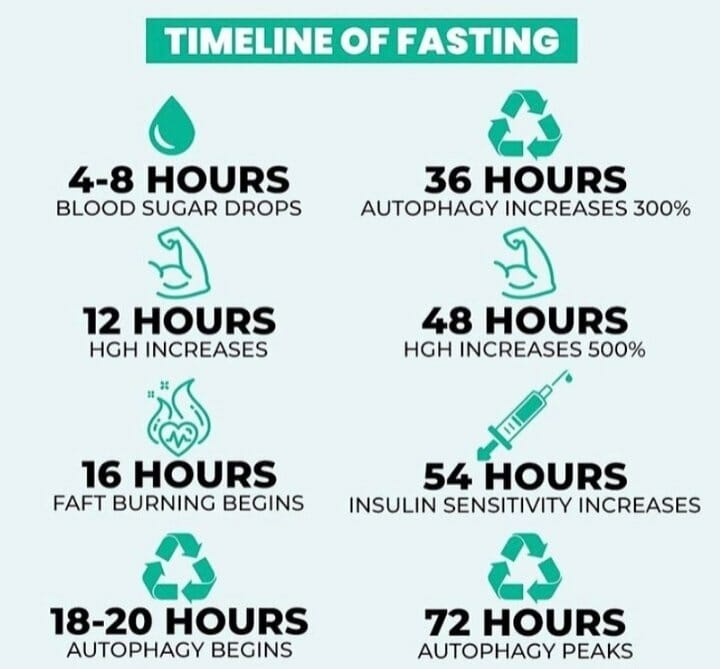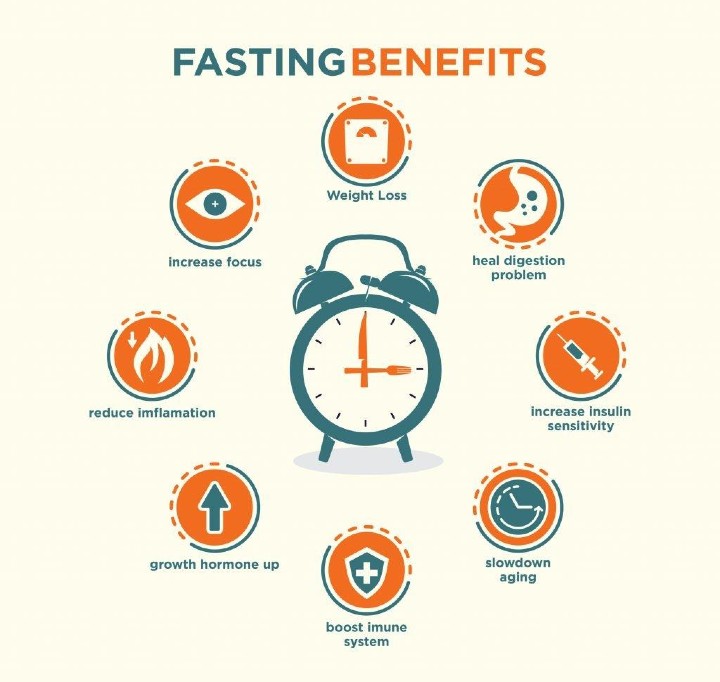Take a look around nature and you would see this yin-yang of Feasting-Fasting everywhere, especially in the wild. One wouldn’t see a lion eat three times a day or keep snacking every hour. Winter season is the most common time for most animals to adopt fasting and/or go into hibernation.
During the human evolutionary process, Fasting was a natural process as food was not available all through the year.

Intermittent Fasting
Table of Contents
WHAT IS FASTING?
Fasting can be defined as the absence of or abstinence from food for natural, medical, religious or ritualistic purposes. The opposite of fasting is Feasting (availability of food).
IS FASTING THE LATEST FAD?
Fasting is one of the newest and most talked about health trends. Ranging from simple weight loss to managing cancer, people across the world have exalted its benefits.
However, in India, fasting is not new. The practice of abstinence from food is followed across religions in one form or the other. Be it Hinduism, Jainism, Islam or Christianity – each have their own approaches.
“WE FAST NOT TO PLEASE THE DIVINE, BUT TO CLEANSE OUR BODY.”
– Gurudev Sri Sri Ravi Shankar
In Ayurveda, fasting has always been one of the core practices. According to this ancient medical practice, abstinence from food kindles the digestive fires and removes toxins from our body, hence making it more effective. It also aids in enhancing one’s mental clarity, thereby, leading them to better health.
Modern medicine too, around 5th Century BCE, recognized the benefits of fasting when the Greek physician, Hippocrates recommended abstinence of food as a medical intervention for curing certain ailments.
WHY SHOULD I FAST?
As hunter gatherers, humans never had access to food 24×7. The availability of a good meal depended on various factors. Thus, they evolved to be able to function without food for long periods of time. In fact, eating just once a day or in two days is more natural than eating 3x a day.
We live in an era of excesses – excess food, technology, mindless entertainment, stress, etc.
With the amount of food, we consume each day, we barely give our body the required break to destress and repair itself.
Hence, if we have to look at fasting from a modern angle – it simply means – you are allowing your overworked body a break from the routine and giving it the chance to digest the previous meal and effectively utilize the nourishment attained from it.
In the process you enable your body to heal, repair and detoxify itself.
HOW DO I START INTERMITTENT FASTING?
Just like everything else, fasting too has evolved over time. The practice focuses on the time duration to eat food rather than just the food alone. The benefits of fasting comes over time and just like developing any other good routine, it requires dedication and practice in order to make it a habit and lifestyle.
At the core of it, fasting promotes zero calorie consumption during the time of a fast. However, there are many types of fasting – Intermittent or time bound fasting, alternate day fasts, dry fast, water fasts, fat fasts, etc.
Intermittent fasting (IF)
This is the most popular and practiced type of fast. It is convenient and easy to get started with. This time of fast cycles between and eating period and fasting period during the day. Some of the best known approaches are –16:8, 18:6 and the 20:4 -time restrictions where the former refers to the fasting hours and the latter the eating window.
16:8 is one of the most popularly followed fasting:feasting timelines in IF. Here’s an idea of how to approach it:
- 10 am – break fast with protein rich meal
- 3 pm – snack or beverage time
- 6 pm – Dinner and final meal of the day
[OR]
- 12 pm – break fast with lunch
- 3-4 pm – small snack break
- 8 pm – dinner & final meal
This is a very flexible approach and you can work the time around your schedule. However, it is recommended to have an 8pm cut off time for dinner, giving you at least 2 hours before bed to digest your meal.
If 16 hours of fasting seems too huge to begin with, start with 12 hours and slowly move to the 16-hour mark.
As you master this approach, you can keep increasing your time of fast and easily achieve a 24-hour mark at least once a week.
Some of the other types of fasting are:
- ADF – Alternate Day fasting. Here a person follows a 24 hour fast every alternate day and eats as usual on the other days.
- 5:2 – Being in a fasted state for 2 days of the week by consuming very low calories and eating as normal during the remaining 5 days.
- Fat Fast – Technically this doesn’t follow the fasting principle of zero calories. However, it is followed when one is looking to attain or maintain a level of ketosis.
- Dry Fast – Not consuming anything, including water during the period of fasting.
BENEFITS OF FASTING
When we eat food, our body uses 75% of its energy to digest the food and reserves only 25% for other functions. However, during a fast, the body is now free to focus its entire energy on other important functions it needs to perform. Having established this, here are a few benefits of Intermittent Fasting.
-
FAT LOSS
This is one of the biggest benefits of Intermittent fasting. During the time of fast, your body tends to utilize the available fat stores for energy. Also, since eating is restricted to within a particular window, there is an automatic restriction in calories and food intake. This leads to efficient fat burning and over time, weight loss. [1] [2]
-
IMPROVING INSULIN SENSITIVITY
Insulin resistance is the core issue for diabetics and studies have shown that calorie restriction aids in reversing insulin resistance in diabetics.
Contrary to popular opinion of diabetics having to eat every 2-3 hours, fasting is a recommended approach to improving insulin sensitivity and managing blood glucose levels. [3] [4]
-
INFLAMMATION
Inflammation is one of the centre points for many chronic health problems like diabetes, heart problems, rheumatoid arthritis and even cancer. Most people do not realise if they body is inflamed unless they are diagnosed with a health problem. Over time, fasting helps in reducing the amount of inflammation in our bodies and thus, reducing the propensity of contracting the above said diseases. [5]
-
AUTOPHAGY
Autophagy is the process of the body eating its own damaged cells or destroying them, thus paving way for newer, healthy ones. It also removes toxins from our body. [6]
-
HEART HEALTH
Consistent fasting helps to reduce Triglycerides and lowers small, dense LDLs, insulin resistance, inflammation – all of which are risk factors for heart disease.
-
BRAIN HEALTH
Fasting brings in mental clarity and alertness. However, studies have gone a few steps ahead and indicated that it may help in protecting against Alzheimer’s and can aid the growth of new brain cells. [7] [8]
-
METABOLISM BOOST
Many studies have indicated that short term fasts are excellent to boost your metabolism. If you experience a slow down in your metabolism, Fasting is an ideal way to jump start it.
WHAT’S HAPPENING TO MY BODY DURING A FAST

What happens to the body during Intermittent Fasting
THINGS TO KEEP IN MIND BEFORE COMMITTING TO INTERMITTENT FASTING
Expert Support and Guidance
If you want to begin your Intermittent fasting journey, but are a little apprehensive or suffer from health/medical conditions like – Pregnancy, Lactation, T1 Diabetes, T2 Diabetes, Blood Pressure, etc. it is recommended to start under the guidance of an expert practitioner.
Hydration:
It is important to stay hydrated during the fast for these two reasons:
- Effective removal of toxins
- Reduction in any hunger or cravings. Many times, thirst is misjudged as hunger and therefore it is more appropriate to drink water than just give into a food craving.
Zero Calorie only
Fasting is effective only when there is no food to be digested. Hence zero calorie liquids like water, black coffee, black tea or lemon water + salt are some of the most highly recommended beverages.
Early Dinner
Fasting times can be as flexible as you want to make it. However, it is highly recommended to have an early dinner or make your last mealtime cut off at 8pm. This gives your body time to digest the food before winding down and going to sleep.
Choosing Healthy Food
In order for fasting to be effective, it is important to stay away from sugary, processed and refined food. Choose natural, less processed and protein rich foods to derive a healthy metabolism.
CONCLUSION
It may take a while to identify which approach works best for you. So, have some patience and experiment with varied approaches until you find one that comfortably works for you. Intermittent fasting coupled with eating healthy is recognized as a very practical and powerful tool towards building a healthy lifestyle. It may require your investment of time, discipline and patience, but it is an investment well worth the effort.
Feel free to reach out to me for any support to get you started on your Intermittent Fasting journey.
